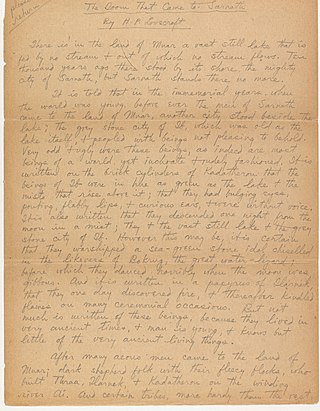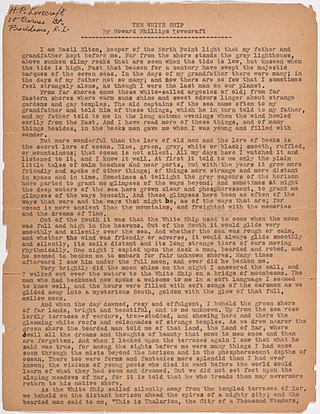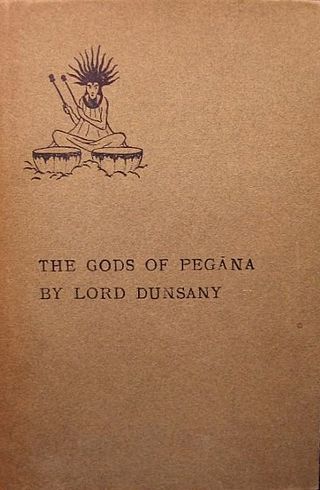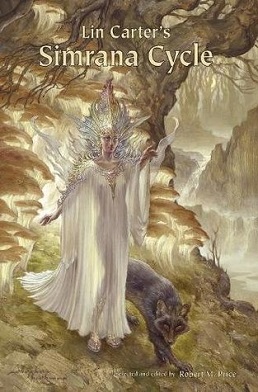Summaries
Poltarnees, Beholder of Ocean
In this story there is a mountain of which, if any man climbs, they never return; many have promised to come back after looking over the peak, but none have returned. There is one woman whose beauty is such that (in theory) a man would come back if promised her hand in marriage. So a man is sent to look over the mountain.
Blagdaross
"On a waste place strewn with bricks in the outskirts of a town", several objects (an old cork, an unstruck match, a broken kettle, a piece of cord/rope, and an old rocking-horse) tell their life stories.
The Madness of Andelsprutz
A tale in which a man visits a city and engages in conversation with two men as to whether or not the city of Andelsprutz is dead or was never alive then one of the men tells a tale of the city and how all cities have souls; he knows because he saw Andelsprutz's soul and engaged in a conversation with her.
Where the Tides Ebb and Flow
A story from the perspective of a dead body and what it experiences.
Bethmoora
A narrator tells the background of the desolate and abandoned city of Bethmoora. The city was abandoned abruptly for mysterious reasons, possibly a warning from the gods, a message from an emperor, disease or the desert. Bethmoora is brought up again in the later story, The Hashish Man.
Idle Days on the Yann
The narrator takes a river voyage down the Yann on the ship Bird of the River. The ship stops at Mandaroon, where the citizens sleep to prevent the gods from dying and dreaming to end; Astahahn, where citizens use ancient rituals to prevent Time from slaying the gods; Perdóndaris, a great trading city; and Nen, the last city on the river. The ship finally reaches the Gate of Yann: two narrow, mountain-high, smooth and pink marble cliffs that the river flows between into the sea. Departing, the protagonist knows he will not meet the captain again, because his fancy is growing weaker.
The Sword and the Idol
A tale of early humans. Loz invents an iron sword and comes to rule the tribe. Generations later, when Loz's descendant Lod is chief, Ird introduces religion to the tribe in the form of the worship of Ged. A battle of wills between Lod and Ird ends with Lod giving the sword to Ird.
The Idle City
Four short short stories told to gain entry to the Idle City.
The Hashish Man
The narrator of "Bethmoora" meets a man at a party who has visited the city more recently with the aid of hashish. He tells the narrator the city was abandoned at the order of emperor Thuba Mleen of Utnar Vehi. He describes some of the horrors of Thuba Mleen before fleeing the party to stay ahead of the police.
Poor Old Bill
A tale of a terrible pirate captain, whose crew maroon him. Unfortunately, while he lives his curses still have magical power, and prevent them from entering any harbor.
The Beggars
A daydream of cheerful beggars in lordly cloaks, who find cheer and fortune in everything.
Carcassonne
After a prophecy given to a king that he will never set foot in the city of Carcassonne, the heroes of the court vow to conquer the city, the location of which is unknown.
In Zaccarath
The king of Zacarath calls for prophecies. The prophets foretell doom, but the king and all of his court hear only tales that tell of everlasting Zacarath. At the end the narrator finds a rock that may once have been part of the marvellous palace of Zacarath.
The Field
The narrator finds a field of flowers that seems to have a malevolence about it. He questions a poet, who informs him it is a battlefield.
The Day of the Poll
A poet kidnaps a voter on election day, and tries to get him to see the beauty and glamour in the world.
The Unhappy Body
A story about a body forced to work for a living, while the soul strives for poetry.

Edward John Moreton Drax Plunkett, 18th Baron of Dunsany was an Anglo-Irish writer and dramatist. Over 90 volumes of fiction, essays, poems and plays appeared in his lifetime, and a modest amount of material was published posthumously. He gained a name in the 1910s as a great writer in the English-speaking world. Best known today are the 1924 fantasy novel, The King of Elfland's Daughter, and his first book, The Gods of Pegāna, which depicts a fictional pantheon. Many critics feel his early work laid grounds for the fantasy genre.

Shub-Niggurath is a deity created by H. P. Lovecraft. She is often associated with the phrase "The Black Goat of the Woods with a Thousand Young". The only other name by which Lovecraft referred to her was "Lord of the Wood" in his story The Whisperer in Darkness.

"The Cats of Ulthar" is a short story written by American fantasy author H. P. Lovecraft in June 1920. In the tale, an unnamed narrator relates the story of how a law forbidding the killing of cats came to be in a town called Ulthar. As the narrative goes, the city is home to an old couple who enjoy capturing and killing the townspeople's cats. When a caravan of wanderers passes through the city, the kitten of an orphan (Menes) traveling with the band disappears. Upon hearing of the couple's violent acts towards cats, Menes invokes a prayer before leaving town that causes the local felines to swarm the cat-killers' house and devour them. Upon witnessing the result, the local politicians pass a law forbidding the killing of cats.

The Dream-Quest of Unknown Kadath is a novella by American writer H. P. Lovecraft. Begun probably in the autumn of 1926, the draft was completed on January 22, 1927 and it remained unrevised and unpublished in his lifetime. It is both the longest of the stories that make up his Dream Cycle and the longest Lovecraft work to feature protagonist Randolph Carter. Along with his 1927 novel The Case of Charles Dexter Ward, it can be considered one of the significant achievements of that period of Lovecraft's writing. The Dream-Quest combines elements of horror and fantasy into an epic tale that illustrates the scope and wonder of humankind's ability to dream.

"The Doom That Came to Sarnath" (1920) is a fantasy short story by American writer H. P. Lovecraft. It is written in a mythic/fantasy style and is associated with his Dream Cycle. It was first published in The Scot, a Scottish amateur fiction magazine, in June 1920.

"The White Ship" is a horror short story by American writer H. P. Lovecraft. It was first published in The United Amateur #2, November 1919, and later appeared in the March 1927 issue of Weird Tales.

The Gods of Pegāna is the first book by Anglo-Irish fantasy writer Lord Dunsany, published in 1905. The book was reviewed favourably but as an unusual piece. One of the more influential reviews was by Edward Thomas in the London Daily Chronicle.

At the Edge of the World is a collection of fantasy short stories by Irish writer Lord Dunsany, edited by Lin Carter. It was first published in paperback by Ballantine Books as the thirteenth volume of its Ballantine Adult Fantasy series in March 1970. It was the series' second Dunsany volume, and the first collection of his shorter fantasies assembled by Carter.

Over the Hills and Far Away is a collection of fantasy short stories by Lord Dunsany, edited by Lin Carter. It was first published in paperback by Ballantine Books as the sixty-fifth volume of its celebrated Ballantine Adult Fantasy series in April 1974. It was the series' sixth Dunsany volume, and the third collection of his shorter fantasies assembled by Carter.

Beyond the Fields We Know is a collection of fantasy short stories by Irish writer Lord Dunsany, and edited by Lin Carter. The title is derived from a description of the location of the border of Elfland used over one hundred times in Lord Dunsany's best-known novel, The King of Elfland's Daughter. It was first published in paperback by Ballantine Books as the forty-seventh volume of its Ballantine Adult Fantasy series in May 1972. It was the series' fourth Dunsany volume, and the second collection of his shorter fantasies assembled by Carter.

The Sword of Welleran and Other Stories is the third book by Anglo-Irish fantasy writer Lord Dunsany, considered a major influence on the work of J. R. R. Tolkien, H. P. Lovecraft, Ursula K. Le Guin, and others. It was first published in hardcover by George Allen & Sons in October 1908, and has been reprinted a number of times since. Issued by the Modern Library in a combined edition with A Dreamer's Tales as A Dreamer's Tales and Other Stories in 1917.

Tales of Three Hemispheres is a collection of fantasy short stories by Lord Dunsany. The first edition was published in Boston by John W. Luce & Co. in November 1919; the first British edition was published in London by T. Fisher Unwin in June 1920.
Joseph Jorkens is the lead character in over 150 short stories written between 1925 and 1957 by the Irish author Lord Dunsany, noted for his fantasy short stories, fantastic plays, novels and other writings. The Jorkens stories, primarily fantasy but also including elements of adventure, mystery and science fiction literature, have been collected in a series of six books, and were a key inspiration for the "fantastic club tale" type of short story.

In the Land of Time and Other Fantasy Tales is a posthumous collection of short stories by the writer Lord Dunsany, in the Penguin Classics series. Edited and with an introduction by S. T. Joshi, it assembles material from across Dunsany's long career. The cover illustration is a colourised version of a classic illustration for an early Dunsany story by his preferred artist, Sidney Sime.

Time and the Gods is an omnibus collection of fantasy stories by Anglo-Irish writer Lord Dunsany. It was first published by Orion Books in 2000 as the second volume of their Fantasy Masterworks series. This omnibus contains all the stories from Dunsany's earlier collections: Time and the Gods, The Sword of Welleran and Other Stories, A Dreamer's Tales, The Book of Wonder, The Last Book of Wonder, and The Gods of Pegāna.

The Collected Jorkens is a three-volume omnibus collection of fantasy short stories by author Lord Dunsany and issued by Night Shade Books, then of Portland, Oregon.

Lin Carter's Simrana Cycle is a collection of fantasy short stories by American writer Lin Carter, selected and edited by Robert M. Price. It was first published in hardcover, trade paperback and ebook by Celaeno Press in February 2018.

"Idle Days on the Yann" is a short story by the Irish writer Lord Dunsany. It takes place in the Lands of Dream and follows an Irishman's voyage down a river flanked by fantastical cities. It was published in the short story collections A Dreamer's Tales (1910) and Tales of Three Hemispheres (1919). Sidney Sime illustrated the story with two images.

















